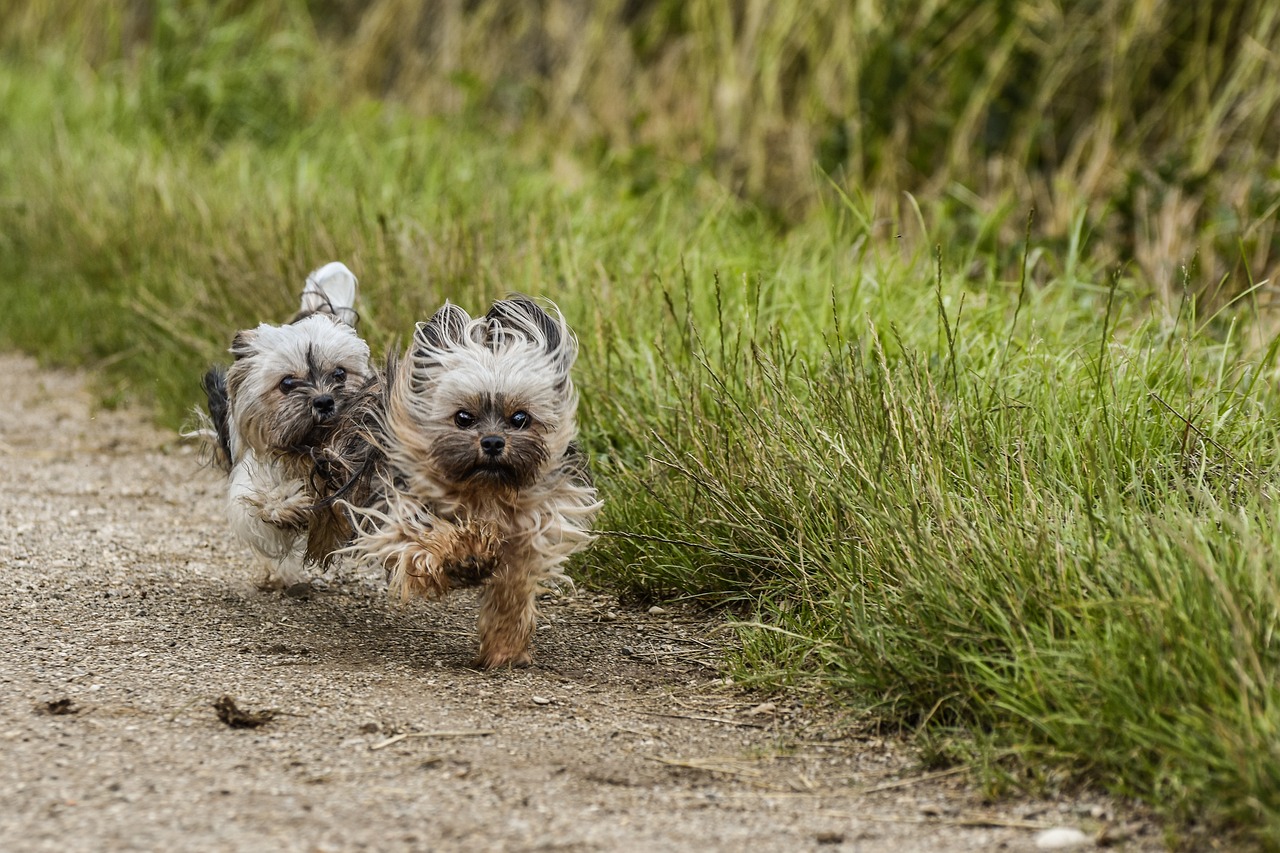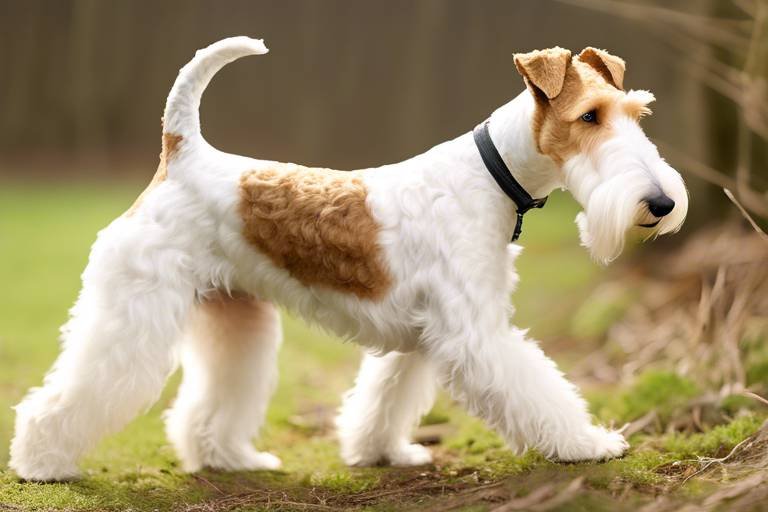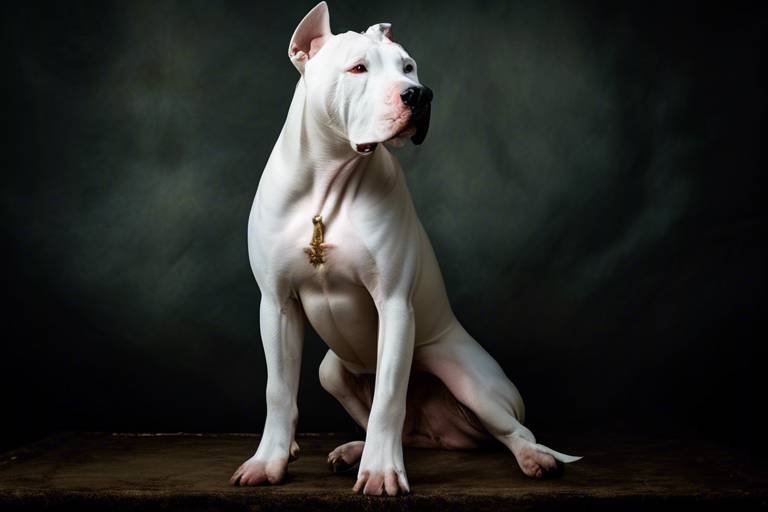Why Scottish Terriers Are Great Companions
If you’ve ever met a Scottish Terrier, you know there’s something special about these little furballs. With their charming personalities and distinctive looks, they have a way of capturing hearts. But what truly makes them stand out as companions? In this article, we’ll explore the unique qualities of Scottish Terriers that make them wonderful companions, including their temperament, intelligence, and loyalty. Whether you’re considering bringing one into your home or just curious about this breed, you’re in for a treat!
Scottish Terriers are known for their unwavering loyalty to their families. This breed often forms a strong bond with their owners, making them feel like a true part of the family. Imagine having a friend who is always by your side, ready to offer comfort and companionship. That’s what a Scottish Terrier brings to the table! They are protective of their loved ones and can be quite vocal if they sense something amiss. This loyalty manifests in their behavior; they thrive on quality time with their humans and often follow them from room to room, eager to be involved in every activity.
When it comes to intelligence, Scottish Terriers excel. They possess a high level of smarts that makes them relatively easy to train, although they can also be a bit stubborn at times. This means that while they can learn commands quickly, they might also test your patience! The key to successful training lies in using positive reinforcement techniques that reward good behavior with treats, praise, or playtime. With a little consistency and creativity, you can harness their intelligent nature to ensure they grow into well-behaved companions.
Proper socialization is crucial for Scottish Terriers. Early exposure to various environments, people, and other animals helps them develop the social skills necessary to navigate the world confidently. Think of it as giving your pup a passport to life—one that allows them to explore new places and meet new friends without fear. Just like humans, dogs can become anxious if they’re not accustomed to different situations. Therefore, introducing them to a variety of experiences during their formative months is essential.
To ensure your Scottish Terrier becomes a well-adjusted companion, consider these essential tips for early socialization:
- Expose them to different environments, such as parks, busy streets, and homes with other pets.
- Encourage interactions with people of all ages, including children and seniors.
- Arrange playdates with other friendly dogs to promote positive experiences.
By starting early, you’ll set the foundation for a confident and friendly dog who is comfortable in various social situations.
Socializing a Scottish Terrier can come with its own set of challenges. Some may be naturally reserved or wary of strangers, leading to fearful or aggressive behavior if not managed properly. If you notice your dog showing signs of anxiety, it’s important to take gradual steps to ease their fears. Here are a few strategies to overcome common challenges:
- Start with short and positive encounters, gradually increasing their exposure to new experiences.
- Use treats and praise to reinforce calm behavior during social situations.
- Consult a professional trainer if you encounter persistent issues.
With patience and persistence, you can help your Scottish Terrier thrive socially.
Scottish Terriers need regular exercise to stay healthy and happy. These little bundles of energy require daily walks, playtime, and mental stimulation. Think of it like this: a tired dog is a happy dog! Engaging in activities like fetch, agility training, or even simple games of hide and seek can keep your Scottish Terrier entertained and well-exercised. Regular physical activity not only helps maintain their weight but also strengthens the bond between you and your furry friend.
Understanding the health considerations of Scottish Terriers is vital for potential owners. Like all breeds, they have specific health issues to be aware of. Common concerns include hip dysplasia, skin conditions, and certain genetic disorders. Being informed about these issues can help you take preventive care measures and ensure your pet lives a long, healthy life.
Regular veterinary check-ups are essential for maintaining your Scottish Terrier's health. Routine visits allow for early detection of potential health issues and ensure that your dog receives necessary vaccinations. Think of your vet as your dog’s health coach—keeping them in tip-top shape and ready for all of life's adventures!
A balanced diet is crucial for the well-being of Scottish Terriers. Proper nutrition helps maintain their energy levels and supports their overall health. When selecting food, look for high-quality dog food that lists meat as the first ingredient and is appropriate for their age and size. Consult your vet for personalized dietary recommendations, ensuring your furry friend gets the nutrients they need to thrive.
Q: How much exercise do Scottish Terriers need daily?
A: Scottish Terriers require at least 30 to 60 minutes of exercise each day, including walks and playtime.
Q: Are Scottish Terriers good with children?
A: Yes, they can be good with children if properly socialized, but supervision is always recommended.
Q: Do Scottish Terriers shed a lot?
A: Scottish Terriers have a wiry coat that requires regular grooming, but they are considered low-shedding dogs.
Q: How can I train my Scottish Terrier to stop barking excessively?
A: Consistent training, positive reinforcement, and addressing the underlying cause of barking can help manage this behavior.

The Loyal Nature of Scottish Terriers
When it comes to canine companions, few breeds can match the unwavering loyalty of the Scottish Terrier. These little bundles of energy are not just pets; they become integral members of the family, often forming deep bonds with their human counterparts. Imagine a friend who is always there, ready to greet you with enthusiasm after a long day. That’s the essence of a Scottish Terrier! Their loyalty shines through in their behavior, whether it’s following you from room to room or curling up next to you on the couch, always eager to be part of your life.
One of the most remarkable aspects of Scottish Terriers is their protective nature. While they may be small, their hearts are enormous, and they take their role as family guardians seriously. They have an innate ability to sense when something is amiss, often alerting their owners to any unusual activity. This instinctive protectiveness can be both comforting and reassuring, making them excellent companions for families and individuals alike.
Moreover, Scottish Terriers are known to be affectionate and playful. They thrive on human interaction and enjoy engaging in playful activities. Whether it’s a game of fetch in the backyard or a cozy cuddle session on a rainy day, these terriers are always up for a good time. Their playful antics can bring a smile to anyone's face, reminding us of the joy that comes from simple moments spent together.
However, it's essential to remember that loyalty is a two-way street. To foster this strong bond, owners should prioritize spending quality time with their Scottish Terriers. Regular walks, play sessions, and training not only keep them physically healthy but also strengthen the emotional connection between the dog and its owner. Building trust is key, and with every shared experience, the loyalty of a Scottish Terrier deepens.
In summary, the loyal nature of Scottish Terriers is one of their most endearing qualities. Their protective instincts, affectionate demeanor, and playful spirit make them wonderful companions. By investing time and love into your relationship with a Scottish Terrier, you’ll find a friend who is not only loyal but will also fill your life with joy and companionship.
- Are Scottish Terriers good with children? Yes, they can be great with children, especially if socialized from a young age.
- How much exercise do Scottish Terriers need? They require regular exercise, ideally 30 minutes to an hour daily.
- Do Scottish Terriers bark a lot? They can be vocal, especially if they sense something unusual, but training can help manage excessive barking.

When it comes to our furry friends, intelligence is a trait that can make all the difference in the world. Scottish Terriers are not just adorable; they are also incredibly smart! Their high level of intelligence means they can learn commands and tricks with relative ease, making training a rewarding experience for both the dog and the owner. Imagine having a companion that not only understands you but can also respond to your requests with enthusiasm. Isn’t that a dream come true?
Training a Scottish Terrier can be a delightful journey, but it does require some patience and consistency. These dogs thrive on mental stimulation, so keeping their minds engaged is crucial. Using positive reinforcement techniques, such as treats and praise, can significantly enhance their learning experience. For instance, when your Scottish Terrier successfully follows a command, shower them with affection and a tasty reward. This not only reinforces the behavior but also strengthens the bond between you and your pet.
It’s important to remember that while Scottish Terriers are trainable, they also have a bit of a stubborn streak. They might test your patience at times, but don’t let that discourage you! Instead, think of it as a challenge. Here are a few tips to make your training sessions more effective:
- Keep it short and fun: Scottish Terriers have short attention spans, so limit training sessions to about 5-10 minutes.
- Be consistent: Use the same commands and cues each time to avoid confusing your dog.
- Incorporate play: Use games and playtime as a reward to keep your dog engaged and motivated.
Another critical aspect of training is socialization. Exposing your Scottish Terrier to different environments, people, and other animals early on can help them become well-rounded companions. This is where their intelligence shines, as they can learn to adapt to various situations with your guidance. Think of socialization as a way to give your dog a crash course in the world around them. The more experiences they have, the more confident they become!
In conclusion, the intelligence of Scottish Terriers makes them not only trainable but also a joy to be around. With the right approach, you can harness their smart nature and ensure they grow up to be well-behaved, friendly, and confident companions. So, grab those treats, get ready to have some fun, and watch your Scottish Terrier shine!
- How long does it take to train a Scottish Terrier? Training duration varies, but with consistency, you can see progress within a few weeks.
- Are Scottish Terriers easy to house train? Yes, they are generally quick learners when it comes to house training, especially with a consistent routine.
- What are some common commands to teach my Scottish Terrier? Start with basic commands like sit, stay, come, and down to establish a strong foundation.
When it comes to Scottish Terriers, socialization is not just a luxury; it’s a necessity. These little bundles of joy, with their spirited personality and charming looks, thrive on interaction with the world around them. Imagine a child who only plays in a single room; they miss out on the adventures and lessons that come from exploring different environments. Similarly, a Scottish Terrier that isn’t properly socialized may grow up to be timid or overly aggressive. This is why it’s crucial to expose them to various settings, people, and other animals early on in their lives.
Socialization helps your Scottish Terrier develop into a well-rounded companion. It’s not just about making them friendly; it’s about teaching them how to navigate the complexities of life. Think of it as giving them a toolkit for understanding their environment. Without these experiences, they might react to new situations with fear or aggression, which can be both stressful for them and concerning for you as an owner.
So, what does effective socialization look like? It involves introducing your Scottish Terrier to a variety of experiences, including:
- Meeting different people, including children and seniors
- Encounters with other dogs of various sizes and temperaments
- Exposure to different environments, such as parks, busy streets, and quiet places
- Experiencing various sounds, from the hustle and bustle of city life to the calm of nature
Each of these interactions plays a pivotal role in shaping your dog’s behavior. For example, a Scottish Terrier that has met a variety of people is less likely to be skittish around strangers. Similarly, those who have engaged with other dogs are more likely to play nicely and exhibit good manners. Remember, the goal is to create positive associations with new experiences. If your pup has a great time meeting a friendly dog, they’ll be more inclined to approach other dogs in the future.
However, socialization doesn’t stop once your pup reaches adulthood. It’s an ongoing process that requires your attention and commitment. As your Scottish Terrier grows, they may encounter new situations that can be overwhelming. Regularly exposing them to different experiences throughout their life will help maintain their social skills and confidence.
In conclusion, the socialization needs of Scottish Terriers are fundamental to their overall development. By providing them with diverse experiences and ensuring positive interactions, you’re not just enhancing their behavior; you’re enriching their lives. So, embrace the adventure of socializing your Scottish Terrier, and watch as they blossom into the loving, confident companion you always dreamed of.
Q: At what age should I start socializing my Scottish Terrier?
A: It's best to begin socializing your Scottish Terrier as early as possible, ideally between 3 to 14 weeks of age. This is the critical period for socialization.
Q: How can I tell if my Scottish Terrier is well-socialized?
A: A well-socialized Scottish Terrier will be calm and friendly around new people, other dogs, and various environments. They should exhibit confidence rather than fear or aggression.
Q: What should I do if my Scottish Terrier shows fear during socialization?
A: If your Scottish Terrier appears scared, it’s essential to take a step back. Allow them to observe from a distance and gradually introduce them to new experiences at their own pace. Positive reinforcement can help build their confidence.
When it comes to raising a Scottish Terrier, early socialization is not just a suggestion; it's an absolute necessity. Think of it as laying the foundation for a strong, confident, and well-adjusted dog. Just like a child learns to navigate the world through experiences, your Scottish Terrier will thrive when introduced to various environments, people, and animals from a young age. The key is to make these experiences positive and rewarding.
One of the best ways to start socializing your Scottish Terrier is to expose them to different settings. For instance, take them to parks, pet stores, or even just on a walk around the neighborhood. This variety helps them adapt to new sights, sounds, and smells, which is crucial for their mental stimulation and emotional growth. It's important to remember that each encounter should be a positive one; if they seem anxious or scared, give them space and try again later.
Another fantastic method is to arrange playdates with other dogs. However, it’s essential to choose companions that are friendly and well-behaved. A negative experience can lead to lasting fears or behavioral issues. Monitor their interactions closely, and intervene if play becomes too rough. This not only helps your Scottish Terrier learn social cues but also teaches them how to communicate effectively with their peers.
Additionally, consider enrolling your Scottish Terrier in a puppy training class. These classes are designed to expose young dogs to various stimuli while teaching them basic commands. It's a win-win situation! Not only do they learn essential skills, but they also get to interact with other dogs and people in a controlled environment. Look for classes that emphasize socialization and positive reinforcement, as these will set your pup up for success.
Lastly, don't forget about the importance of positive reinforcement. Use treats, praise, and affection to reward your Scottish Terrier for brave behavior during socialization. A simple “good boy” or “well done” can boost their confidence immensely. The more they associate new experiences with positive outcomes, the more willing they will be to explore the world around them.
In summary, early socialization for your Scottish Terrier involves a blend of exposure to new environments, interaction with other dogs, participation in training classes, and the use of positive reinforcement. By investing time and effort into these early experiences, you are not just raising a pet; you are nurturing a lifelong companion who is confident, happy, and well-adjusted.
- What age should I start socializing my Scottish Terrier? It's best to start socializing your puppy as early as possible, ideally between 3 to 14 weeks of age when they are most receptive to new experiences.
- How can I tell if my dog is properly socialized? A well-socialized dog is comfortable around other dogs and people, displays confidence in new environments, and shows minimal signs of fear or aggression.
- What should I do if my Scottish Terrier is fearful or aggressive? Consult a professional dog trainer or behaviorist who can provide guidance tailored to your dog's needs.
Socializing your Scottish Terrier can be a rewarding yet challenging journey. One of the most common hurdles owners face is the natural shyness or fearfulness that some Scottish Terriers exhibit, especially in unfamiliar situations. This can manifest as barking, growling, or even retreating when encountering new people, animals, or environments. These reactions are often rooted in their instinctual traits, as they were originally bred to be alert and protective. To help your furry friend overcome these challenges, it's essential to approach socialization with patience and understanding.
Another challenge is the tendency for Scottish Terriers to become territorial. They may display aggressive behaviors when they perceive a threat to their home or family. This instinct can complicate socialization, especially with larger dogs or unfamiliar visitors. To mitigate this, it’s vital to introduce your Scottish Terrier to new experiences gradually and in a controlled manner. For example, consider the following strategies:
- Start with controlled introductions to other dogs in a safe environment.
- Use positive reinforcement to reward calm behavior during encounters.
- Gradually expose them to various sounds and sights, such as traffic or crowds, to build their confidence.
Additionally, some Scottish Terriers may struggle with overexcitement during play, which can lead to rough behavior. This excitement can sometimes be misinterpreted as aggression, making it important for owners to recognize the difference. To help your pup manage their energy, engage in structured play sessions that allow them to learn appropriate behavior while having fun. Incorporating mental stimulation through puzzle toys can also help channel their energy positively.
Lastly, one of the biggest challenges is the inconsistency in socialization experiences. If your Scottish Terrier has had limited exposure to different environments or people, they may become overwhelmed when faced with new situations later in life. To prevent this, strive for a consistent routine of socialization that includes a variety of experiences, such as:
- Visiting dog parks
- Attending puppy classes
- Participating in community events
By addressing these common socialization challenges with a proactive approach, you can help your Scottish Terrier grow into a well-adjusted and confident companion. Remember, the key to successful socialization lies in patience, consistency, and a positive attitude. With time and effort, your Scottish Terrier will flourish in their interactions with the world around them.
Q: How can I tell if my Scottish Terrier is properly socialized?
A: A well-socialized Scottish Terrier should be comfortable in various environments, exhibit friendly behavior towards other dogs and people, and show curiosity rather than fear in new situations.
Q: What age should I start socializing my Scottish Terrier?
A: It's best to start socializing your Scottish Terrier as early as possible, ideally between 3 to 14 weeks of age, as this is a crucial period for developing social skills.
Q: How long should socialization sessions last?
A: Keep socialization sessions short but frequent, around 5 to 15 minutes, to prevent overwhelming your dog while still providing enough exposure to new experiences.
Q: What should I do if my Scottish Terrier shows aggression during socialization?
A: If your dog displays aggressive behavior, it's important to consult a professional trainer or behaviorist who can provide guidance tailored to your dog's needs.
When it comes to Scottish Terriers, keeping them active is not just a suggestion—it's a necessity! These spirited little dogs are full of energy and require a good amount of exercise to stay healthy and happy. Think of them as tiny bundles of joy that need to be let loose to explore the world around them. A bored Scottish Terrier can quickly turn into a mischievous one, so it's essential to incorporate regular physical activity into their daily routine.
Generally, Scottish Terriers need at least 30 to 60 minutes of exercise each day. This can include brisk walks, playtime in the yard, or engaging in fun activities like fetch or agility training. The key is to keep things varied and interesting. Imagine if you were stuck doing the same workout every day—yawn, right? The same goes for your furry friend! Mixing up their routine not only keeps them physically fit but also mentally stimulated.
Here are some fun ways to ensure your Scottish Terrier gets the exercise they need:
- Daily Walks: A daily stroll not only provides exercise but also exposes your pup to different sights, sounds, and smells, which is crucial for their sensory development.
- Playtime: Engage in interactive games like tug-of-war or hide-and-seek. These activities strengthen your bond and provide both mental and physical stimulation.
- Dog Parks: Visiting a dog park allows your Scottish Terrier to socialize with other dogs, which is fantastic for their social skills and provides ample space to run around.
- Agility Training: This is a fun way to challenge your dog physically and mentally. Set up a small obstacle course in your backyard and watch them navigate through it!
But wait, there's more! Consider incorporating some mental exercises into your routine. Scottish Terriers are intelligent and thrive on challenges. Puzzle toys, training sessions, and scent games can keep their minds sharp while also providing a great outlet for their energy. It's like giving them a brain workout!
Remember, every dog is unique, and their exercise needs may vary. Factors such as age, health, and individual temperament play a significant role in determining how much activity your Scottish Terrier requires. Always pay attention to their cues—if they seem restless or overly energetic, it might be time for an extra play session!
In conclusion, keeping your Scottish Terrier active is vital for their overall well-being. By providing a mix of physical and mental exercises, you can ensure that your furry companion remains happy, healthy, and well-adjusted. After all, a tired dog is a happy dog!
1. How much exercise do Scottish Terriers need daily?
Scottish Terriers typically need around 30 to 60 minutes of exercise each day, which can include walks, playtime, and other activities.
2. What are some good activities for Scottish Terriers?
Activities like daily walks, fetch, tug-of-war, agility training, and visits to dog parks are excellent for keeping them active and engaged.
3. Can Scottish Terriers be left alone for long periods?
While Scottish Terriers can tolerate some alone time, they thrive on companionship and should not be left alone for extended periods regularly.
4. What signs indicate my Scottish Terrier needs more exercise?
If your dog is exhibiting signs of restlessness, excessive barking, or destructive behavior, it may indicate that they need more physical activity.

When it comes to owning a Scottish Terrier, understanding their health considerations is absolutely crucial. These adorable little furballs, with their distinctive beards and sturdy build, can be prone to certain health issues that every potential owner should be aware of. Just like how you wouldn’t want to drive a car without knowing about its maintenance needs, you’ll want to be well-informed about the health aspects of your Scottish Terrier to ensure they lead a long, happy, and healthy life.
One of the most common health issues faced by Scottish Terriers is hip dysplasia. This genetic condition can lead to arthritis and pain as your pup ages. Regular vet check-ups will help in early detection, allowing for proactive management of any potential issues. Speaking of vet visits, they should be a regular part of your pet care routine. These visits are essential not only for vaccinations but also for monitoring the overall health of your furry companion.
Another significant aspect is their dietary needs. Scottish Terriers require a balanced diet to maintain their energy levels and overall health. You might be wondering what that entails. Well, a diet rich in high-quality proteins, healthy fats, and essential vitamins is key. Here’s a quick breakdown of their dietary requirements:
| Nutrient | Importance |
|---|---|
| Protein | Essential for muscle development and overall energy. |
| Fats | Provides energy and supports healthy skin and coat. |
| Vitamins | Boosts immune system and supports overall health. |
But wait, there’s more! Scottish Terriers can also be prone to certain skin conditions, such as allergies and dermatitis. These issues can often stem from environmental factors or specific food ingredients. Regular grooming can help keep their coat healthy and reduce the risk of skin problems. Plus, it’s a great opportunity for bonding time!
In addition to these health considerations, it’s important to be aware of their exercise requirements. Scottish Terriers are energetic little dogs that thrive on regular physical activity. They’re not just couch potatoes; they need to burn off that energy! Daily walks, playtime in the yard, or even engaging in fun games like fetch can keep them physically fit and mentally stimulated. Remember, a tired dog is a happy dog!
To sum it all up, keeping an eye on your Scottish Terrier's health is vital. From regular vet visits to a balanced diet and sufficient exercise, every aspect plays a role in ensuring your furry friend lives a vibrant life. By being proactive about their health, you can enjoy countless joyful moments together, creating memories that will last a lifetime.
- How often should I take my Scottish Terrier to the vet?
Regular vet visits are recommended at least once a year, but more often if your dog has existing health issues. - What is the best diet for a Scottish Terrier?
A high-quality dog food that lists meat as the first ingredient is ideal. Consult your vet for specific recommendations based on your dog's age and health. - How much exercise does a Scottish Terrier need?
Scottish Terriers typically need at least 30 minutes of exercise daily, which can include walks, playtime, or agility training.
When it comes to keeping your Scottish Terrier healthy, regular vet visits are absolutely essential. Just like you wouldn’t skip your own doctor’s appointments, your furry friend deserves the same level of care. These visits are not just about vaccinations; they play a crucial role in monitoring your dog’s overall health and well-being. Imagine your Scottish Terrier as a little athlete—just like a sports star needs regular check-ups to ensure they’re in top shape, your pup needs the same attention to thrive.
During these visits, your veterinarian will perform a variety of important checks. They’ll assess your dog’s weight, check their coat and skin for any abnormalities, and listen to their heart and lungs. This routine examination can catch potential health issues early, which is key to successful treatment. Think of it this way: a stitch in time saves nine! By addressing any health concerns promptly, you can prevent more serious issues down the line.
But what exactly should you expect during these vet visits? Here’s a quick overview:
- Vaccinations: Keeping your Scottish Terrier up-to-date on vaccines is vital for preventing diseases.
- Parasite Control: Regular checks for fleas, ticks, and worms can save your dog from discomfort and illness.
- Dental Care: Oral health is often overlooked, but your vet can provide tips on keeping your pup’s teeth clean.
- Behavioral Assessments: If you notice any changes in behavior, your vet can help determine if there’s an underlying health issue.
Moreover, establishing a good relationship with your veterinarian can make these visits less stressful for both you and your Scottish Terrier. A friendly vet who understands your dog’s temperament will make all the difference. Remember, your dog can pick up on your emotions, so if you’re calm and positive, your pup is likely to feel the same way. It’s all about creating a comfortable environment where your dog feels safe.
To sum it up, regular vet visits are a cornerstone of your Scottish Terrier's health care routine. They ensure that your furry friend stays happy, healthy, and full of life. So, don’t wait until something seems off—make those appointments a priority! Your Scottish Terrier will thank you for it with wagging tails and joyful barks.
Q: How often should I take my Scottish Terrier to the vet?
A: It’s generally recommended to visit the vet at least once a year for routine check-ups, but puppies and older dogs may require more frequent visits.
Q: What vaccinations does my Scottish Terrier need?
A: Common vaccinations include rabies, distemper, parvovirus, and Bordetella. Your vet will provide a tailored vaccination schedule based on your dog's age and health status.
Q: Are there specific health issues I should watch for in Scottish Terriers?
A: Yes, Scottish Terriers can be prone to certain health issues, such as hip dysplasia, allergies, and certain types of cancer. Regular vet visits can help monitor these risks.
Q: What can I do to prepare my Scottish Terrier for a vet visit?
A: Try to make the experience as positive as possible. Bring treats, use a calm tone, and practice handling your dog’s paws and ears at home to make them more comfortable during the exam.
When it comes to the dietary needs of your Scottish Terrier, understanding the right balance of nutrients is crucial for their overall health and vitality. These little bundles of joy are not just adorable; they require a well-rounded diet to support their energetic lifestyle and maintain their unique physique. Think of their diet as the fuel that powers their playful spirit and loyal heart!
First and foremost, a balanced diet for a Scottish Terrier typically includes high-quality protein sources. Look for dog foods that list meat (like chicken, beef, or lamb) as the first ingredient. This is essential because protein helps build and repair tissues, and it provides the energy they need to romp around the house or chase after their favorite toys. In fact, Scottish Terriers are known for their spirited playfulness, and adequate protein intake can keep them active and engaged.
Next, don't overlook the importance of healthy fats. Omega-3 and Omega-6 fatty acids are vital for maintaining a shiny coat and healthy skin. Foods enriched with fish oil or flaxseed oil can be beneficial. These fats not only enhance their appearance but also support joint health, which is particularly important for a breed that can be prone to certain joint issues.
Carbohydrates are another essential component of your Scottish Terrier's diet. They provide a quick source of energy and are often found in ingredients like brown rice, oats, and sweet potatoes. However, it’s crucial to ensure that these carbs come from quality sources. Avoid fillers or artificial additives, as they can lead to digestive issues and may not provide the necessary nutrients your pup needs.
To make things even simpler, here’s a quick nutritional breakdown for your Scottish Terrier:
| Nutrient | Importance |
|---|---|
| Protein | Essential for growth, energy, and tissue repair. |
| Healthy Fats | Supports skin and coat health, and aids in joint function. |
| Carbohydrates | Provides energy and aids in digestion. |
| Vitamins & Minerals | Supports overall health and immune function. |
Now, let’s talk about portion sizes. Scottish Terriers are small but mighty, and their caloric needs can vary based on age, weight, and activity level. Generally, adult Scottish Terriers require about 300 to 400 calories per day. It's best to feed them two meals a day to help maintain their energy levels and prevent obesity, which can be a concern for this breed.
Lastly, always remember to keep fresh water available at all times. Hydration is key, especially after a day of play! And while it might be tempting to share your table scraps, be cautious. Many human foods can be harmful to dogs, so stick to treats that are specifically formulated for canines.
In summary, providing a balanced and nutritious diet for your Scottish Terrier is essential to ensure they thrive. By focusing on high-quality ingredients and maintaining a proper feeding schedule, you can help your furry friend live a long, healthy, and happy life!
- What should I feed my Scottish Terrier? A high-quality dog food with real meat as the first ingredient is ideal. Look for foods that contain healthy fats, carbohydrates, and essential vitamins and minerals.
- How much should I feed my Scottish Terrier? Generally, adult Scottish Terriers need about 300 to 400 calories per day, divided into two meals.
- Can I give my Scottish Terrier table scraps? It's best to avoid table scraps, as many human foods can be harmful to dogs. Stick to dog-specific treats.
- How can I tell if my Scottish Terrier is overweight? You should be able to feel their ribs without too much pressure. If you can’t, they may need to lose some weight.
Frequently Asked Questions
- What makes Scottish Terriers such loyal companions?
Scottish Terriers are renowned for their unwavering loyalty. They form strong bonds with their families and often exhibit protective behaviors. This loyalty manifests in their desire to be close to their owners, making them excellent companions who thrive on affection and attention.
- Are Scottish Terriers easy to train?
Absolutely! Scottish Terriers are intelligent dogs, which makes them relatively easy to train. They respond well to positive reinforcement techniques, such as treats and praise. Consistency and patience are key, and with the right approach, you can teach them a variety of commands and tricks.
- How important is socialization for Scottish Terriers?
Socialization is crucial for Scottish Terriers. Early exposure to different people, environments, and other animals helps them develop into well-adjusted adults. A well-socialized Scottish Terrier is more likely to be friendly and confident, reducing the chances of behavioral issues in the future.
- What are some tips for early socialization?
Start socializing your Scottish Terrier as early as possible. Introduce them to various environments, sounds, and people. Puppy classes can be a great way to provide structured socialization. Always ensure these experiences are positive, using treats and praise to create a happy association.
- What common socialization challenges might I face?
Some common challenges include fear of new experiences or aggression towards other dogs. To overcome these issues, introduce your Scottish Terrier to new situations gradually and always ensure they feel safe. If you encounter persistent problems, consulting a professional trainer or behaviorist can be beneficial.
- How much exercise do Scottish Terriers need?
Scottish Terriers require regular exercise to maintain their health and happiness. Daily walks, playtime, and mental stimulation are essential. Engaging them in activities like fetch or agility courses can also keep them active and entertained, preventing boredom and destructive behaviors.
- What health issues should I be aware of?
Scottish Terriers can be prone to certain health issues, including hip dysplasia and certain skin conditions. Regular veterinary check-ups are important to monitor their health. Being proactive about their care can help catch any potential problems early and keep your furry friend happy and healthy.
- How often should I take my Scottish Terrier to the vet?
Routine veterinary check-ups are essential for your Scottish Terrier's health. Ideally, you should take them for an annual visit, but if they have specific health concerns, more frequent visits may be necessary. Vaccinations and preventative care should also be kept up-to-date during these visits.
- What dietary needs do Scottish Terriers have?
A balanced diet is crucial for the well-being of Scottish Terriers. They require high-quality dog food that meets their nutritional needs. Look for food that lists meat as the first ingredient and consult your vet for specific dietary recommendations based on your dog's age, weight, and health.



















